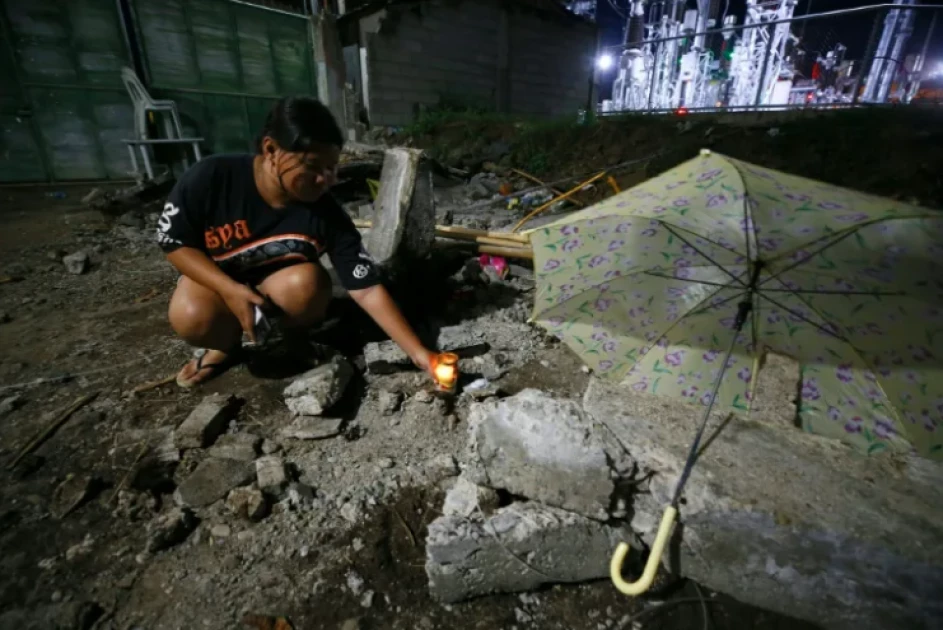Seven killed as strong quakes strike southern Philippines

A relative of a victim killed in the earthquake places a candle where he died, in Mati town, Davao Oriental province in southern island of Mindanao (Mark NAVALES)

Audio By Vocalize
Two powerful quakes
struck off the southern Philippines on Friday, killing at least seven people
and triggering tsunami warnings.
The biggest of the
quakes, with a magnitude of 7.4, hit about 20 kilometres (12 miles) off Manay
town in the Mindanao region just before 10 am (0100 GMT), according to the
United States Geological Survey.
An aftershock with a
magnitude of 6.7 rocked the same area almost 10 hours later, one of scores that
followed the morning quake.
Both came 11 days
after a magnitude 6.9 earthquake killed 75 people and injured more than 1,200
in Cebu province in the central Philippines, according to official data.
Three miners
tunnelling for gold were killed when a shaft collapsed in the mountains west of
Manay during the larger quake, rescue official Kent Simeon of Pantukan town
told AFP.
One miner was pulled
out alive and several others were injured in the remote hamlet of Gumayan, he
said.
"Some tunnels
collapsed, but the miners managed to get out," Simeon said.
One person was
killed in Mati city when a wall collapsed, while two others suffered fatal
heart attacks, city disaster official Charlemagne Bagasol told AFP.
Another person was
crushed by falling debris in Davao city, more than 100 kilometres west of the
epicentre, police said.
Philippine
authorities issued tsunami warnings shortly after the morning quake as well as
for the early evening one, ordering evacuations along the eastern seaboard,
though no big waves had been monitored.
The Pacific Tsunami
Warning Center lifted its own alert for the Philippines, Palau and Indonesia at
around noon.
Wes Caasi, an
official in Tagum city, northwest of Manay, told AFP that a government event at
the city hall descended into chaos as panicked attendees fled. "They
screamed and ran."
Confirming videos
that circulated on social media, Caasi said she saw city workers scrambling
down a metal Christmas tree they were decorating when the first quake struck.
Nice Eugenio from
Tagum city told AFP the strong aftershock knocked out power in her
neighbourhood.
"It lasted only
a few seconds, but (it) was very strong. I felt like I was going to faint from
nervousness," she said.
A plane that had
just landed in Davao city was shaken by the aftershock, which prevented
passengers from disembarking immediately, an AFP photographer on board said.
AFP journalists
later saw Davao residents queueing for fuel at crowded petrol stations at
night.
Witnesses and
officials said the quakes appeared to have caused only minor damage, while the
Philippine seismology office said it had recorded more than 300 aftershocks.
There were no
reports of collapsed buildings but "there were landslides and our bridges
exhibited cracks", Davao Oriental provincial governor Nelson Dayanghirang
told the ABS-CBN network.
"Some buildings
were damaged," he said.
More than 200 patients
were evacuated from the Manay district hospital, where tents were set up
outside to shelter them after the building's foundations cracked, Dayanghirang
said.
Classes were
suspended and non-essential workers were sent home, the provincial government said
on Facebook.
Christine Sierte, a
teacher in Compostela town, said violent shaking started when she was in an
online meeting, and the ceilings of some buildings later fell though no one was
injured.
"It was very
slow at first, then it got stronger... That's the longest time of my life. We
weren't able to walk out of the building immediately because the shaking was so
strong," she told AFP.
Earthquakes are a
near-daily occurrence in the Philippines, which is situated on the Pacific
"Ring of Fire", an arc of intense seismic activity stretching from
Japan through Southeast Asia and across the Pacific basin.
An 8.0-magnitude
quake off Mindanao island's southwest coast in 1976 unleashed a tsunami that
left 8,000 people dead or missing, the Philippines' deadliest natural disaster.


Leave a Comment